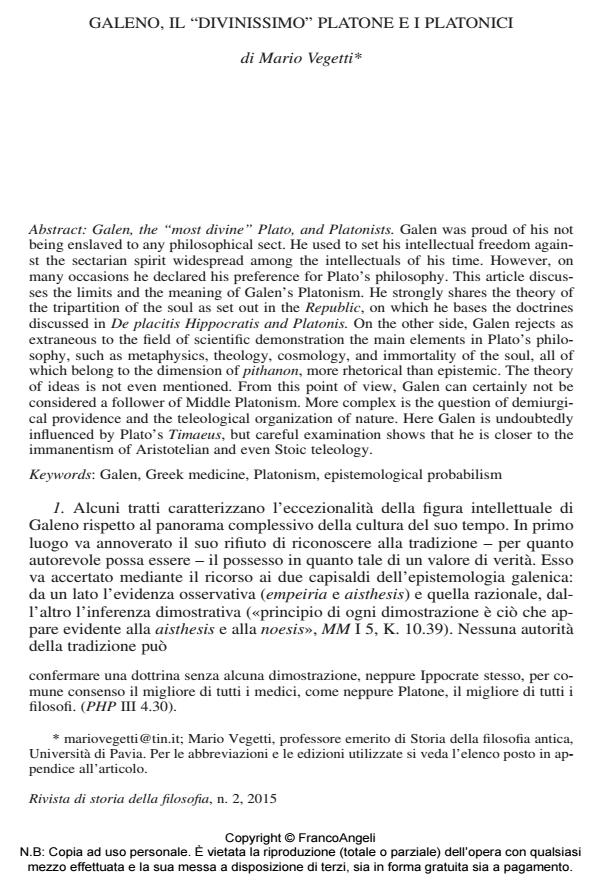Galeno, il "divinissimo" Platone e i platonici
Titolo Rivista RIVISTA DI STORIA DELLA FILOSOFIA
Autori/Curatori Mario Vegetti
Anno di pubblicazione 2015 Fascicolo 2015/2
Lingua Italiano Numero pagine 25 P. 447-471 Dimensione file 132 KB
DOI 10.3280/SF2015-002009
Il DOI è il codice a barre della proprietà intellettuale: per saperne di più
clicca qui
Qui sotto puoi vedere in anteprima la prima pagina di questo articolo.
Se questo articolo ti interessa, lo puoi acquistare (e scaricare in formato pdf) seguendo le facili indicazioni per acquistare il download credit. Acquista Download Credits per scaricare questo Articolo in formato PDF

FrancoAngeli è membro della Publishers International Linking Association, Inc (PILA), associazione indipendente e non profit per facilitare (attraverso i servizi tecnologici implementati da CrossRef.org) l’accesso degli studiosi ai contenuti digitali nelle pubblicazioni professionali e scientifiche.
Galen was proud of his not being enslaved to any philosophical sect. He used to set his intellectual freedom against the sectarian spirit widespread among the intellectuals of his time. However, on many occasions he declared his preference for Plato’s philosophy. This article discusses the limits and the meaning of Galen’s Platonism. He strongly shares the theory of the tripartition of the soul as set out in the Republic, on which he bases the doctrines discussed in De placitis Hippocratis and Platonis. On the other side, Galen rejects as extraneous to the field of scientific demonstration the main elements in Plato’s philosophy, such as metaphysics, theology, cosmology, and immortality of the soul, all of which belong to the dimension of pithanon, more rhetorical than epistemic. The theory of ideas is not even mentioned. From this point of view, Galen can certainly not be considered a follower of Middle Platonism. More complex is the question of demiurgical providence and the teleological organization of nature. Here Galen is undoubtedly influenced by Plato’s Timaeus, but careful examination shows that he is closer to the immanentism of Aristotelian and even Stoic teleology.
Parole chiave:Galen, Greek medicine, Platonism, epistemological probabilism
- Galen and the Formal Cause Riccardo Chiaradonna, in Elenchos /2021 pp.95
DOI: 10.1515/elen-2021-0008
Mario Vegetti, Galeno, il "divinissimo" Platone e i platonici in "RIVISTA DI STORIA DELLA FILOSOFIA" 2/2015, pp 447-471, DOI: 10.3280/SF2015-002009